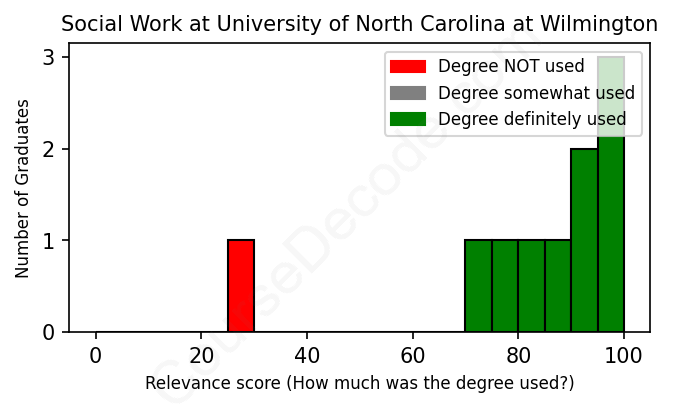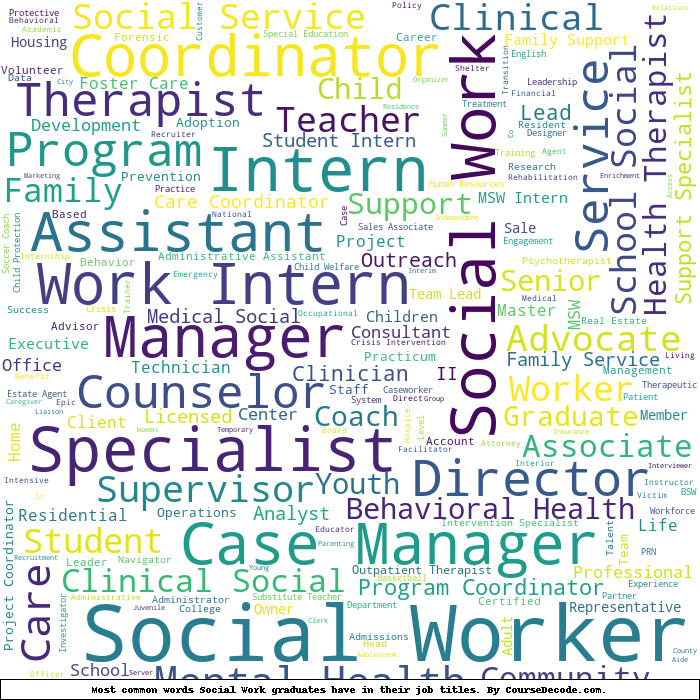
First, some facts. Of the Social Work graduates from University of North Carolina at Wilmington we've analyzed , here's how many have used (or NOT used) their degree in their career:

These are estimates based on AI analysis of 10 LinkedIn profiles (see below).
The verdict? Significantly above average. Overall, with an average relevance score of 83%, Social Work graduates from University of North Carolina at Wilmington have a much higher likelihood (+16%) of finding work in this field compared to the average graduate across all fields:
And for comparison, here's the chart for all profiles we've looked at across all degrees.
Also, after graduating, 60% of these graduates have pursued further education other than another Bachelor's degree (such as a Masters degree or other), compared to the average across all profiles of 35%. This suggests you may need more than just a Bachelors degree to be competitive as a Social Work graduate.
See the details:
|
Relevance score: 73% We think this person has gone into a career highly relevant to their degree. We think this person has gone into a career highly relevant to their degree.
DEGREE INFOGraduated in 2014 from University of North Carolina at Wilmington with a Bachelor's degree in Social Work. Also pursued further education since (see below). JOB HISTORY SINCE GRADUATIONMedical Case Manager Open Door Clinic of Greater Elgin (Open Door) Sep 2014 - Sep 2016 Outpatient Therapist  Milwaukee VA Center Sep 2016 - May 2017 Victim Advocate  United States Department of Defense Sep 2017 - May 2023 Employment Assistant Program Manager  United States Department of Defense Jun 2017 - Present Suicide Prevention Program Manager  United States Department of Defense Aug 2022 - Present FURTHER DEGREES DONE SINCE GRADUATINGMastersDominican University 2015 - 2017 ABOUTDedicated professional with passion for Social Work and Military Service |
The top 10 most common jobs done by the graduates we've analyzed (ranked most common to least) are:
When looking at the job trajectories of graduates with a degree in Social Work from the University of North Carolina at Wilmington, it’s clear that there’s a mix of roles some that are super relevant to their education and others that seem pretty unrelated. Many graduates have ventured into roles like Outpatient Therapist, Care Coordinator, and School Social Worker, where their social work education is not just beneficial but essential. These positions involve a direct application of social work principles, community engagement, and direct counseling, which aligns perfectly with what they studied. It’s encouraging to see that many are actively working in fields where they can make a positive impact, like supporting mental health or working with families in need.
However, it's also notable that there are quite a few alumni who ended up in positions that don’t really connect to social work at all. Jobs in sales, administrative roles, or even teaching positions often lack the specific social work knowledge and skills required for their degree. This might point to the reality that not every Social Work graduate is able to find a job directly in their field, or perhaps they're exploring different career paths that don’t align perfectly but still utilize some interpersonal skills. Overall, while there’s a solid number of graduates working directly in social work-related roles, it's evident that the job market can sometimes lead them astray into areas that don’t quite harness their full educational background.
Here is a visual representation of the most common words in job titles for Social Work graduates (this is across all Social Work graduates we've analyzed, not just those who went to University of North Carolina at Wilmington):

Graduates from the University of North Carolina at Wilmington with a degree in Social Work have generally embarked on diverse yet meaningful career paths. For many, their first job after graduation often relates directly to social work or community services. Roles such as care coordinators, mental health technicians, and juvenile court counselors seem to be common stepping stones post-graduation. This early experience in the field typically helps them build vital skills, connections, and insights into social work that pave the way for more advanced positions down the line.
As we look five to ten years post-graduation, many of these alumni have settled into more specialized roles, frequently moving between different organizations while climbing the career ladder. You can see some graduates becoming licensed clinical social workers (LCSWs), program managers, or even directors in nonprofit organizations. However, there are also instances where individuals have taken a detour into unrelated fields, such as sales or educational support roles. Overall, though there are some who have veered away from traditional social work roles, a significant number remain dedicated to social services, indicating a strong commitment to the profession and its impact on their communities.
Honestly, a Bachelor’s degree in Social Work, like the one at UNCW, can be pretty demanding, but it’s not insurmountable. It usually involves a good mix of classes that cover everything from human behavior to social policies, and there are practical fieldwork components where you get to apply what you learn. Some students find it easier to connect with the material since it’s often relatable and meaningful, but there’s definitely a lot of reading and writing involved, and some classes can be pretty intense. Overall, it’s about average in difficulty compared to other majors, but if you’re passionate about helping others and can handle some tough, emotional topics, you’ll likely find it rewarding as you go through the program.
Most commonly, in the LinkedIn profiles we've looked at, it takes people 4 years to finish a Bachelor degree in Social Work.
Looking at the job paths of these graduates from UNC Wilmington, it seems like their salaries could vary quite a bit, but overall, it doesn't scream "big bucks." The ones finding success in fields like management and specialized counseling (especially in VA or DOD roles) might be pulling in decent money, while others starting out in more entry-level positions or non-profits might be earning less initially. Roles in education and direct social work can also be relatively lower-paying compared to management positions in the same field. So, while some might be doing okay, others might still be working their way up to those higher salaries that can come with more experience and specialized roles.
Here is a visual representation of the most common words seen in the "about" section of LinkedIn profiles who have a Bachelor degree in Social Work (this is across all Social Work graduates we've analyzed, not just those who went to University of North Carolina at Wilmington). This may or may not be useful:

Here are all colleges offering a Bachelor degree in Social Work (ordered by the average relevance score of their Social Work graduates, best to worst) where we have analyzed at least 10 of their graduates: